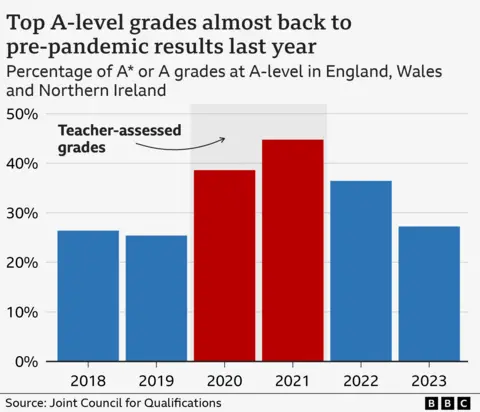Students wait for A-level, T-level and BTec grades
 Getty Images
Getty ImagesStudents in England, Wales and Northern Ireland will receive A-level, T-level and BTec Nationals results on Thursday morning.
It is the first year that A-level grades are expected to fall back down to 2019 levels in all three nations.
It follows a spike in top grades in 2020 and 2021, when exams were cancelled because of Covid, and a phased effort to bring them back down.
Extra measures in Wales aim to prevent students’ marks from falling substantially below 2019 levels.
The pass rate for Higher exams in Scotland returned to its 2019 level last week, while the pass rate for National 5s and Advanced Highers dropped further.
The Universities and Colleges Admissions Service (Ucas) said anyone who did not get the results they needed to meet university offers would find spaces in clearing, its online system that advertises courses with vacancies.

‘My coma inspired me to study medicine’
By Kate McGough, reporting from Burnley College
 BBC / Dan Nelson
BBC / Dan NelsonEshan, from Burnley, is hoping he will get the grades he needs to study medicine.
He was in a coma in 2022 for three weeks and says that experience inspired him to be a doctor.
“I saw how doctors, nurses and everybody works together in the aims of caring for a patient, and I want to be a part of that team,” he says.
Eshan has an offer to study medicine at St Andrews University, in Fife.
It is a contextual offer, which in this case means the university has lowered its grade requirements to make the course more accessible for Eshan, as someone from a deprived area.
Eshan, who will also be the first person in his family to go to university, needs AAB from his A-levels in chemistry, biology and psychology – although he is holding out hope for even higher grades.
“I’m hoping for a couple of A*s, I’ve worked hard for them, so hopefully they’re there on the piece of paper,” he says.

AS-level results will also be released. In Wales and Northern Ireland, these will count towards a student’s final A-level result next summer.
This is also the third year of results for vocational T-level qualifications in England.
To achieve the technical qualification, time is split between classroom learning and industry placements – with students awarded a pass, merit, distinction or distinction* after two years of work and study.
About 200,000 students are due to get BTec National results, and Cambridge Technicals will also be released.
Exams were cancelled in 2020 and 2021 because of Covid. Pupils’ grades were based on teachers’ predictions instead, leading to a spike in top results.
Phased approaches were then introduced bring results back down to 2019 levels.
In England, exams regulator Ofqual aimed to reduce results to that level last year (although they remained slightly higher).
But in Wales and Northern Ireland, this will be the first year that grades are expected to fall back in line with pre-Covid levels.

Last year, 27.2% of all grades were marked at A* or A – compared to 25.4% in 2019.
Most students getting their A-level results will have been in Year 9 when Covid hit, and will have sat GCSE exams in 2022 with extra help, like advance information about what to revise.
Qualifications Wales said it will be using statistics to help set the grade boundaries to prevent marks dropping substantially below 2019 levels, arguing that there was still a risk that performance in some subjects would not have fully recovered since the pandemic.
In England and Northern Ireland, the way boundaries are decided has returned to normal.
A spokesperson for universities admission service Ucas said there would be just under 30,000 courses available through clearing.
“For anyone who doesn’t receive the results they were expecting or those who want to reconsider their choice, there will be plenty of options,” they said.
“As is the case each year, clearing is likely to be competitive for the most selective courses and at the most selective universities.”
Students have been advised to look at what is available in clearing ahead of results day, in case they do not get the results they needed for their firm or insurance choices.
Thursday’s results come after the government launched a review of the national curriculum in England.
A report by the National Foundation for Educational Research, commissioned by the British Academy, suggests the range of subjects young people are studying after the age of 16 has narrowed, with a particular decline in arts and humanities subjects.






